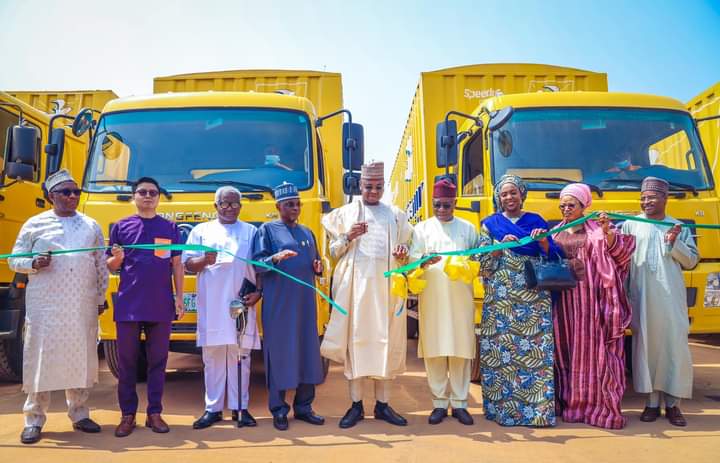President Muhammadu Buhari has presented the National Policy on 5G for Nigeria’s Digital Economy, instructing all security institutions to use the technology as soon as possible to improve the country’s security.
The Federal Executive Council (FEC) authorized 5G technology on September 8, 2021, after a lengthy deliberation.
The president said during the technology’s launch that the federal government will take full use of the prospects that 5G offers for the country’s economy, security, and well-being.
He also assuaged concerns about 5G’s health safety, stating that such concerns had been “well handled” in crafting a policy that was appropriate for the country.
The president emphasized that 5G technologies might assist practically every sector of the economy, including increased connection, better healthcare, support for education while developing smart cities, and improving agriculture, among other benefits. “It will also let security institutions communicate in real time.” 5G technology is substantially quicker than previous digital technologies and allows for communication in near real time. This might be a game-changer in terms of bolstering our efforts to improve security across the country.
“It will allow our security institutions to utilize robotics, autonomous vehicles, augmented and virtual reality to efficiently solve any security concerns we encounter,” he said.
He added that the National 5G Policy featured a deployment plan to ensure that the technologies are available in major cities across the country.
According to him, the policy is consistent with the administration’s commitment to fostering the digital economy as a tool for national economic diversification.
“It also aims to make 5G a key economic driver, a catalyst for smart city development in the country, and a platform for employment creation in the digital economy.”
Following that, he reassured investors that when Nigeria begins to use the technology, the federal government will continue to offer an enabling environment for their businesses to thrive.
Buhari has asked Prof. Isa Pantami, Nigeria’s Minister of Communications and Digital Economy, to oversee the policy’s implementation, which is being carried out by the Nigerian Communications Commission with the help of other government agencies.
The president also took advantage of the opportunity to outline how his administration has fostered an atmosphere that encourages investment in Nigeria’s digital economy.
Meanwhile, he recalled that the road to the unveiling of the 5G National Policy began with the publication of the National Digital Economy Policy and Strategy in November 2019 and the introduction of many initiatives to promote the digital economy.
The Nigerian National Broadband Plan and the National Policy for the Promotion of Indigenous Content in the Nigerian Telecommunications Sector, he claimed, were two among them.
The president stated that the agreement reached by the National Economic Council in 2013 to set the cost of the Right of Way at N145 per linear metre was only executed when the Federal Government intervened in late 2019.
Following that, he reassured investors that when Nigeria begins to use the technology, the federal government will continue to offer an enabling environment for their businesses to thrive.
Buhari has asked Prof. Isa Pantami, Minister of Communications and Digital Economy, to oversee the policy’s implementation, which is being carried out by the Nigerian Communications Commission with the help of other government agencies.
The president also took advantage of the opportunity to outline how his administration has fostered an atmosphere that encourages investment in Nigeria’s digital economy.
Meanwhile, he recalled that the road to the unveiling of the 5G National Policy began with the publication of the National Digital Economy Policy and Strategy in November 2019 and the introduction of many initiatives to promote the digital economy.
The Nigerian National Broadband Plan and the National Policy for the Promotion of Indigenous Content in the Nigerian Telecommunications Sector, he said, were among them.
The president stated that the agreement reached by the National Economic Council in 2013 to set the cost of the Right of Way at N145 per linear metre was only executed when the Federal Government intervened in late 2019.
He stated that the ICT sector was critical in allowing Nigeria’s economy to quickly recover from the COVID-19 pandemic-induced slump.
“According to the National Bureau of Statistics’ GDP Report, the ICT industry was the fastest growing sector in the fourth quarter of 2020 and for the entire year 2020, with double-digit growth rates of 14.70% and 12.90%, respectively.”
In the second quarter of last year, the industry contributed 17.92 percent to our GDP, which was its greatest contribution ever. “Our efforts to foster the expansion of our digital economy have been vindicated by all of these amazing and substantial results.”
Buhari remembered that 5G trials began in some selected sites in November 2019 and described the process of drafting the National 5G Policy as “painstaking, inclusive, and dedicated.”
“Multi-sectoral stakeholders then discussed on the trial report to ensure that health, security, and other concerns were successfully addressed in formulating a policy that matches our country,” the statement continued.
Nigeria would be in a better position to leverage the potential of 5G technology to further boost the economy and improve well-being indicators according to the National 5G Policy.
With increasing remittances to the Federation Account, the settlement of lingering concerns in the industry, and the successful auctioning of the 3.5 gigahertz (GHz) spectrum for the deployment of 5G technology, Pantami claimed the sector had achieved unparalleled successes.
He commended the president for his unwavering support for the sector, noting that the federal government had completed 1,667 ICT-related projects in less than two years.
“As of August 2021, the sector had paid over N1 trillion to the Federation Account, which is exceptional because normal remittances are around 200 billion annually, and this has been significantly boosted,” he said.
Pantami revealed that the reserve price for the 5G spectrum auction was N75 billion per spectrum, and each spectrum was assigned to the winners at that price.
Given other countries’ experiences and available information, the Minister expressed confidence that Nigeria will reap the most benefits from the adoption of 5G technology.



